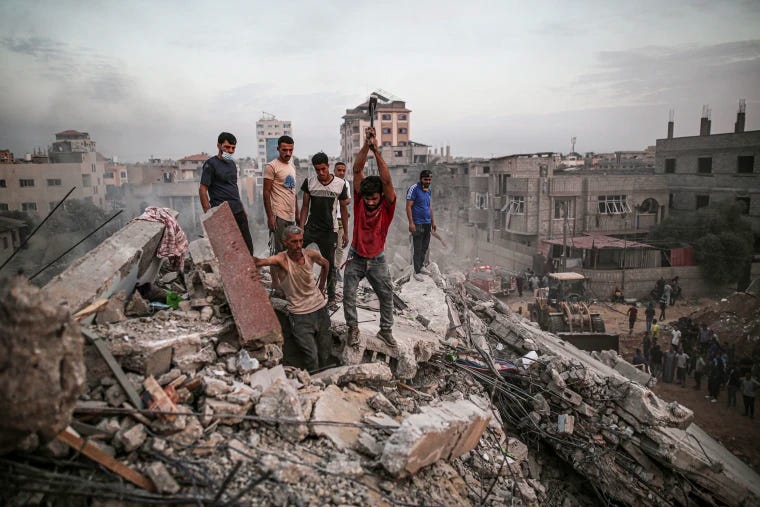Norman Finkelstein’s Gaza: A Book Review by Khaled Beydoun
The essential story of Gaza
“The world’s largest concentration camp,” is what Norman Finkelstein calls Gaza. That narrow strip of land, which has spiraled into an endless expanse of death, is the central protagonist of Gaza: An Inquest Into its Martyrdom - a book that reads into the soul of Gaza.
Finkelstein chronicles Gaza through the intimacy of pain and knowledge. He, more than most, intimately understands the crucible of concentration camps and the harrowing tale of a besieged people. His parents endured the World War II camps, as Holocaust survivors, while his scholarly entrenchment into that besieged Palestinian plot of land guides his pen at every turn.
It is that empathy wed to intellect that marks his book, Inquest, as the magnum opus on the most consequential strip of land in the world right now. Finkelstein is not only a leading voice on Gaza, but in a world where expertise is casually disavowed and penetrating research cast aside, perhaps the voice on Gaza.
Finkelstein’s voice has been a revelation on the likes of Uncensored with Piers Morgan , reemerging at a time when it – both in spoken and written form – are needed most.
I picked up the book years ago, for the first time, but have returned to it faithfully after the event of October 7th. It is a living source of knowledge on Gaza, providing context and content missing from the popular discourse. Inquest is a powerfully written and meticulously researched examination of the Israeli-Palestinian conflict that surrounds Gaza, focusing on the densely packed plot of land widely called an open-air prison. Finkelstein, known for his scathing criticism of Israeli police and humanization of Palestinians, provides a compelling narrative that goes beyond geopolitical analysis and ethnography, emphasizing the human cost of the enduring conflict. It is, from one angle, a love letter to a people longing for dignity; a dignity deferred by military confinement, and today, denied by genocidal violence.
The book which stops long before the prevailing crisis, is an analytical guide to understanding the context and catalysts of the events unfolding. To call it an essential read would be an understatement, given the urgency of a moment bereft of intellectual courage wed to expertise.
The book begins by delving into the historical context, offering readers a comprehensive understanding of the complex dynamics that have shaped Gaza's trajectory. Finkelstein navigates through decades of political and military developments, setting the stage for a nuanced exploration of the region’s challenges. Drawing on international law and historical evidence, he methodically exposes the disproportionate use of force employed by the Israeli military against the Palestinian population of Gaza.
This is force that the world sees today, unhinged and unchecked, on terrestrial media screens and virtual timelines, leveled on the heads of Palestinians reduced to mere objects instead of living beings. Finkelstein, however, counters this dehumanization at every turn of the page, centering Palestinians as fully developed individuals. A dignification that counters the flattening hands of Israeli and American propaganda, which functions alongside the military destruction of Gaza and its people. It is, again, a dystopian love letter scribed across 440 pages.
Central to Finkelstein's inquest is a profound examination of the various military operations carried out in Gaza, dissecting their impact on civilians and infrastructure. Through a critical lens, he scrutinizes the legal and ethical dimensions of these actions, challenging prevailing narratives and calling for accountability. Finkelstein echoes the voices of the marginalized, emphasizing the lived experiences of those caught in the crossfire, aligning with a broader tradition of advocacy for justice.
The author also engages with media representations and political discourses surrounding Gaza, dismantling misconceptions that often obscure the realities on the ground. Finkelstein's approach is characterized by empathy and a commitment to humanizing the Palestinian experience, resonating with a call for a more compassionate and equitable understanding of the conflict.
In examining the aftermath of military operations, Finkelstein sheds light on the challenges of reconstruction and the persistent struggles faced by Palestinians in Gaza. The book serves as a poignant reminder of the long-lasting impact of conflict on civilian populations, urging readers to confront the human dimensions of geopolitical struggles. By combining rigorous scholarship with a compassionate narrative, he contributes to a broader conversation about the Israeli-Palestinian conflict, challenging readers to critically reassess their understanding and advocate for a more just and empathetic world.
A world that has unraveled over the last two months. But a world that can be redeemed, if not reconstructed in part, through empathy and intellect – the wedded virtues that guided Finkelstein’s writing of this masterful book. If the images of the last two months haunted you to action, couple them with Finkelstein’s words in Inquest to find that that intellectual companion to the emotions that will translate rage into guided action.
Khaled A. Beydoun is an author and law professor. He publishes his daily insights on his socials at @khaledbeydoun.




Saw Norman Finkelstein at an event on the Lower East Side a few weeks ago. He is a powerhouse of knowledge and morality. He should debate anyone and everyone on Palestine.
Great article! From the river to the sea, Palestine will be free 🇵🇸! #EndEthnicCleansing ! #CeasefireNow !